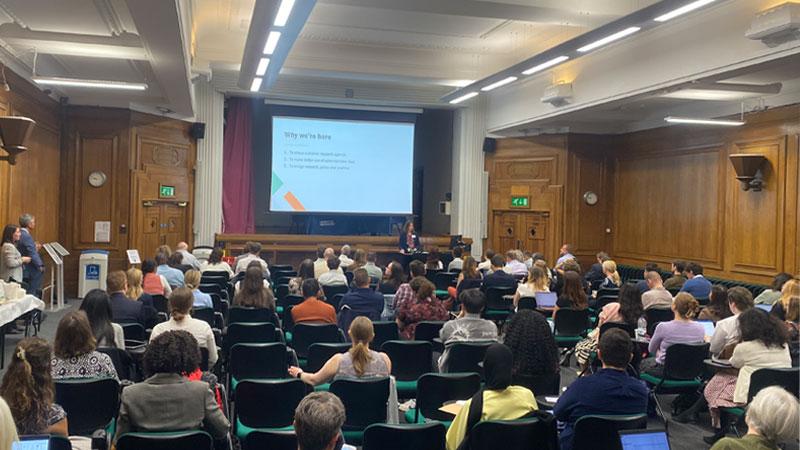The University of Westminster joined forces with the National Foundation for Educational Research (NFER) to host a research conference on Administrative Data Research (ADR) England’s Youth Transitions project. The conference brought together academics, policymakers, funders and youth sector leaders to explore how administrative data can support the development of more effective policies helping disadvantaged young people transitioning in and out of education and training.

The ADR England Research Community Catalyst: Youth Transitions project aims to raise awareness about evidence gaps in the field of youth transitions and enable researchers to address them using administrative data. The project is co-funded by ADR England, Youth Futures Foundation and the Centre for Transforming Access and Student Outcomes in Higher Education (TASO) and led by NFER with co-investigators at the University of Westminster, UCL Centre for Education Policy and Equalising Opportunities and FFT Education Datalab.
Over 100 attendees were welcomed to the University’s historic Little Titchfield Street building for a series of presentations, panel discussions and workshops focused on using administrative data to support youth transitions to employment or further and higher education. The sessions built on discussions from a “Forgotten Third” policy event at the University in January led by project co-investigators Professor Peter Urwin, Professor of Applied Economics and Director of the Centre for Employment Research at Westminster, and Dave Thomson, Chief Statistician at FFT Education Datalab.
The conference was chaired by Youth Employment UK Ambassador Kayla Sibanda who set the tone for the day with an inspiring welcome address emphasising the importance of education. This was followed by opening remarks from Westminster’s Vice-Chancellor and President Professor Peter Bonfield, who commented on the University’s long history of helping people from disadvantaged backgrounds to access education as London’s first polytechnic established in 1838, and Karen Powell, Head of Research Strategy and Commissioning for ADR England.

Kayla introducing the first panel
Discussions began with a presentation from Chris Webber, Deputy Director of the Government’s Open Innovation Team, who provided attendees with tips for influencing government policy and practical strategies for researchers to engage policymakers.
This was followed by the first of the day’s breakout sessions, which saw attendees split into four workshops to discuss various ways in which administrative data can be used to address specific issues seen in youth transitions. These included transitions into and out of NEET-hood (Not in Education, Employment or Training), transitions into and out of higher education (HE), young people’s policy journeys and equality gaps, and evaluating outcomes in HE.
Attendees came back together for a panel session and Q&A on data developments and the future of linked data chaired by Rebecca Wheater at NFER. Panellists included David Burnett from the Department of Education, Dr Emma Gordon from ADR UK, Stephen Jobling from the Ministry of Justice and Graham Knox from the Department for Work and Pensions.
After a networking lunch, Westminster’s Professor Urwin delivered a presentation on how to shape sustainable futures. This discussed youth transitions in relation to the United Nations Sustainable Development Goals (UN SDGs) agenda, reflecting the University’s institutional commitment to sustainable development.

Professor Urwin delivering a breakout session
Delegates then had the opportunity to learn more about funding for youth transitions research through a panel session on research priorities from a funders’ perspective. The session was chaired by the project’s Principal Investigator Jude Hillary, who asked a series of funding-related questions to representatives from UK research foundations. This included Dr Emily Tanner from the Nuffield Foundation, Olly Newton from the Edge Foundation and Anna Round from Youth Futures Foundation.
Following presentations on youth justice from Rob Street, Director of Justice at the Nuffield Foundation, and Dr Veruska Oppedisano, Reader in Economics at the University of Westminster, attendees separated into small groups to apply what they had learnt so far to address evidence gaps in youth transitions. Each group generated a research question that was later distributed to all attendees for further reflection on how these gaps can be solved.
Delegates then attended a second workshop as part of the afternoon breakout sessions, before regrouping for the final presentation of the day on the power and potential of administrative data from Dr Emma Gordon, CEO of ADR UK.
About the conference, Principal Investigator of the Advancing Youth Transitions project Jude Hillary said: “This event marked an important moment in our shared effort to strengthen the evidence base around the journeys of disadvantaged young people through education and into employment. It was fantastic to bring together over 100 academics, policymakers, funders, and youth sector leaders to connect, learn and collaborate. I’m especially grateful to ADR England, Youth Futures Foundation and TASO for funding this important work, and to the University of Westminster for so generously hosting us.”
Co-Investigator Westminster’s Professor Peter Urwin added: “Administrative data provides exciting opportunities for new research, informing policy and practice change that improves outcomes for young people at risk of marginalisation. The conference is a key milestone in our drive to bring together all stakeholders and support this programme of work, building sustainable youth transitions and delivering social justice for disadvantaged young people."
Emma Gordon, CEO of ADR England, said: “The Youth Transitions conference was a fantastic opportunity to bring people together across a range of sectors to understand what research is now possible in this area and consider future directions. The evidence base is growing all the time in this vital research area, and I am proud of the role ADR UK has played in catalysing it.”
This event directly contributed to several of the UN SDGs including 4: Quality Education, 8: Decent Work and Economic Growth and 17: Partnerships for the Goals. Since 2019, the University of Westminster has used the SDGs holistically to frame strategic decisions to help students and colleagues fulfil their potential and contribute to a more sustainable, equitable and healthier society.
Find out more about research at the University of Westminster.









